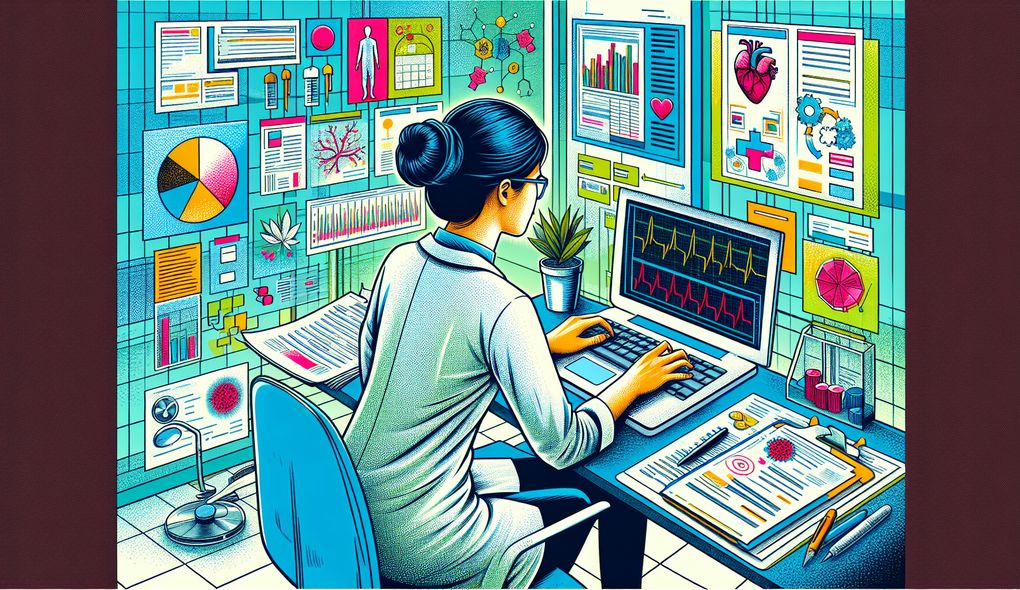What role does a Clinical Documentation Improvement Specialist play?
SENIOR LEVEL

Sample answer to the question:
A Clinical Documentation Improvement Specialist plays a crucial role in improving the accuracy and quality of patient medical records. They work closely with medical professionals to ensure that clinical documentation accurately reflects the level of service provided, patient severity, and conditions treated. They also educate medical staff on best practices for documentation and collaborate with them to obtain additional information for accurate coding. The specialist stays updated with regulatory guidelines and identifies and rectifies any gaps in documentation. They also analyze data to identify trends for documentation enhancement and prepare reports on improvement outcomes.
Here is a more solid answer:
As a Clinical Documentation Improvement Specialist, I play a crucial role in enhancing the accuracy and quality of patient medical records. I utilize my strong analytical and critical thinking skills to conduct thorough chart reviews and certify that the clinical documentation is precise and complete. Communication is key in my role, and I excel in both written and verbal communication, collaborating effectively with physicians and healthcare team members. I am detail-oriented, ensuring that the documentation reflects the level of service, patient severity, and conditions treated. With my extensive knowledge of healthcare laws and regulations, I stay up-to-date with regulatory compliance guidelines and adhere to them in the medical documentation process. In addition, I have strong organizational and time management skills, allowing me to handle multiple documentation improvement strategies, participate in quality improvement initiatives, and serve as a resource for coding staff. I also utilize data analytics tools to analyze trends and prepare reports on improvement outcomes.
Why is this a more solid answer?
The solid answer provides more specific details about how the candidate demonstrates the required skills and qualifications listed in the job description. However, it can still be improved by providing more specific examples and achievements.
An example of a exceptional answer:
As a Clinical Documentation Improvement Specialist, I play a critical role in improving the accuracy and quality of patient medical records. With my strong analytical and critical thinking skills, I conduct thorough chart reviews, collaborating closely with physicians and healthcare team members to certify that the clinical documentation is precise and complete. My excellent written and verbal communication skills allow me to effectively educate and train medical staff on best practices for clinical documentation. Attention to detail is my forte, ensuring that the documentation reflects the level of service, patient severity, and conditions treated. I am well-versed in healthcare laws and regulations, consistently staying updated with regulatory compliance guidelines and ensuring adherence throughout the documentation process. My strong organizational and time management skills enable me to juggle multiple improvement strategies, actively participating in quality improvement initiatives and committees. I serve as a reliable resource for coding staff, assisting with complex cases and providing detailed documentation. Utilizing data analytics tools, I analyze trends to identify opportunities for documentation enhancement, offering valuable insights to the organization. I also prepare detailed reports on documentation improvement outcomes, providing management and stakeholders with actionable information.
Why is this an exceptional answer?
The exceptional answer provides specific examples and achievements that demonstrate the candidate's expertise in each evaluation area. It also highlights their ability to provide valuable insights and collaborate effectively with others.
How to prepare for this question:
- Gain a deep understanding of medical terminology, coding guidelines, and healthcare regulations.
- Stay updated with the latest healthcare laws, regulations, and standards.
- Develop strong analytical and critical thinking skills.
- Enhance your written and verbal communication skills.
- Practice collaborating effectively with multidisciplinary teams.
- Pay attention to detail and commit to accuracy in all aspects of clinical documentation.
- Improve your organizational and time management skills.
- Familiarize yourself with data analytics tools used for reporting and performance analysis in healthcare.
- Seek certification in Clinical Documentation Improvement to enhance your qualifications.
- Gain experience in clinical documentation, medical coding, or similar roles within a healthcare setting.
- Be proficient in using electronic health record systems and medical coding software.
- Stay updated with ICD-10, CPT coding, and DRG systems.
- Understand the healthcare reimbursement process and its impact on clinical documentation.
What are interviewers evaluating with this question?
- Analytical and critical thinking skills
- Written and verbal communication skills
- Collaboration skills
- Attention to detail
- Education and training abilities
- Organizational and time management skills
- Knowledge of healthcare laws and regulations
- Proficiency in data analytics tools

